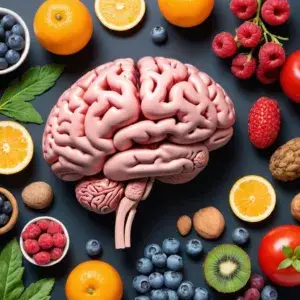Table of Contents
What are Omega 3 Fatty Acids?
Have you ever wondered how these tiny molecules you often hear about, called Omega-3 fatty acids, contribute to the complexity of your brain function? I’ve uncovered the science behind it and I’m here to explain. Omega-3s are more than just a buzzword in the world of nutrition; they’re essential fats that our bodies can’t manufacture by themselves. They play pivotal roles in maintaining our health, especially in the brain.
You see, the brain is a hub of activity requiring the right nutrients to operate at its best. Current science has forged a link between Omega-3s and our cognitive mechanics. That’s what I’ll explore with you. As we delve into the different Omega-3 fatty acids—alpha-linolenic acid (ALA), eicosapentaenoic acid (EPA), and docosahexaenoic acid (DHA)—it becomes clear that they each contribute uniquely to brain health.
Recent studies have cast light on how these fatty acids may sharpen our minds and improve cognitive functions. For instance, DHA is a major structural component of your brain’s neurons. It’s found in the cell membranes and aids in transmitting signals between brain cells. Isn’t it fascinating how a nutrient can make such a marked impact?
With the foundation laid out, it’s time to see how these molecules actively work in our bodies. As we move forward, I’ll outline the pathways by which Omega-3s enhance brain functions such as memory, mood, and cognitive speed. Ready to dive in? You’ll soon discover how these microscopic giants of nutrition punch well above their weight in the realm of brain health.
The Pathway to a Sharper Mind: How Omega 3 Fatty Acids Boost Brain Function
I’m sure by now you’ve heard that good fats, particularly Omega-3 fatty acids, are essential for your overall well-being. But how exactly do they benefit your brain? Delving into the science, Omega-3s play a pivotal role in maintaining the structure and function of brain cells, which is critical for staying sharp.
These fatty acids are components of cell membranes, and they ensure that the complex communication network in your brain operates smoothly. One important type of Omega-3, docosahexaenoic acid (DHA), is highly concentrated in the brain and is essential for the health of neurons, aiding in the transmission of signals between them. Suffice to say, when your diet is rich in Omega-3s, you’re literally feeding your brain the nutrients it needs to thrive.
Now, Omega-3s don’t just support structure; they also protect it. They are known for their neuroprotective properties, safeguarding neurons from damage and supporting neuroplasticity—the brain’s ability to form new connections. This means that recovering from injuries or adapting to new learning and experiences gets a helpful boost from these fats.
Another key benefit is the reduction of inflammation. Chronic inflammation is a known enemy of cognitive function, and Omega-3s are like the peacekeepers of your body, fighting against inflammatory processes that can harm the brain. By calming the flames of inflammation, Omega-3s can potentially reduce the risk of neurodegenerative diseases that often lead to cognitive decline.
What’s more, for those who struggle with mood disorders such as depression or anxiety, Omega-3s might offer a glimmer of hope. Clinical studies suggest that a diet rich in Omega-3s can alleviate symptoms of these conditions, improving mood and emotional well-being.
As we transition to the practical side of things, keep in mind that getting the right amount of Omega-3s is crucial for reaping these brain-boosting benefits. In the following section, we’ll explore the best sources of Omega-3s and how to incorporate them into your diet effectively. It’s important to know that what you eat directly influences your brain’s health and function, so choosing your meals wisely can be a game-changer.
Nourishing Your Neurons: Optimal Sources and Intake of Omega-3s
What you eat plays a pivotal role in the health of your brain. When it comes to Omega-3 fatty acids, you’re not just looking for quantity but also the quality of your intake. Let’s get into the best sources for these vital nutrients.
First, it’s worth noting that not all Omega-3s are created equal. The focus here is often on EPA and DHA, the types most beneficial for brain health, typically found in marine sources. Fish like salmon, mackerel, and sardines, as well as algae, are prime choices.
If you’re a vegetarian or vegan, you’ve not been left out of the Omega-3 equation. Flaxseeds, chia seeds, and walnuts are excellent sources of ALA, which your body can partially convert to EPA and DHA.
How much Omega-3 you need can vary. General guidelines suggest a minimum of 250 to 500 mg combined EPA and DHA per day for healthy adults. However, those with specific health conditions may require different amounts, and it’s wise to consult a healthcare provider to tailor your intake.
For those who struggle to get enough Omega-3 from their diet alone, supplements can be a practical option. Fish oil is the most common, but krill oil and algal oil are alternatives that may provide better absorption and avoid the issue of fishy aftertaste.
Balance is crucial. Omega-6 fatty acids, found in many vegetable oils and processed foods, are also essential but can compete with Omega-3s for space in your cell membranes. An excessive amount of Omega-6s can lead to inflammation, upending the brain benefits of Omega-3s. Striking the right balance between these fatty acids is key—aim for an Omega-6 to Omega-3 ratio of around 4:1 or lower.
Building a Better Brain: Lifestyle Choices That Complement Omega-3 Benefits
While integrating Omega-3 fatty acids into your diet is a key step toward better brain function, it’s just a piece of the puzzle. To maximize the benefits, consider complementary lifestyle choices that support cognitive health.
Regular physical activity is a robust ally to Omega-3s. Exercise increases blood flow to the brain, delivering the oxygen and nutrients essential for peak performance. When combined with a diet rich in Omega-3s, your brain can thrive.
Engaging in cognitive exercises is another way to harness the full potential of Omega-3s. Activities like puzzles, learning new skills, or even playing musical instruments stimulate the brain and encourage the growth of new neural connections.
It’s essential to distinguish between well-founded recommendations and common myths about Omega-3s. While they are powerful nutrients, they are not a cure-all. Real gains in brain function come from a holistic approach encompassing diet, physical, and mental fitness.
In conclusion, consider Omega-3 fatty acids as valuable tools in your toolkit for maintaining and improving brain health. Alongside physical activity and mental challenges, you’re setting the stage for a sharper, more resilient mind. It’s the consistent, daily choices that build a strong foundation for cognitive longevity and wellbeing.
Resources
- “Omega-3 Fatty Acids and Brain Health”
Harvard T.H. Chan School of Public Health
Link - “Omega-3 Fatty Acids and Cognitive Function”
Nutrients, 2020
Link - “The Role of Omega-3 Fatty Acids in Brain Development and Mental Health”
Frontiers in Psychiatry, 2019
Link - “Fish, Omega-3, and Cognitive Decline: The Role of Omega-3 Fatty Acids in Brain Health”
Journal of Alzheimer’s Disease, 2017
Link - “Omega-3 Supplementation and Brain Function: A Review of Evidence”
American Journal of Clinical Nutrition, 2013
Link





